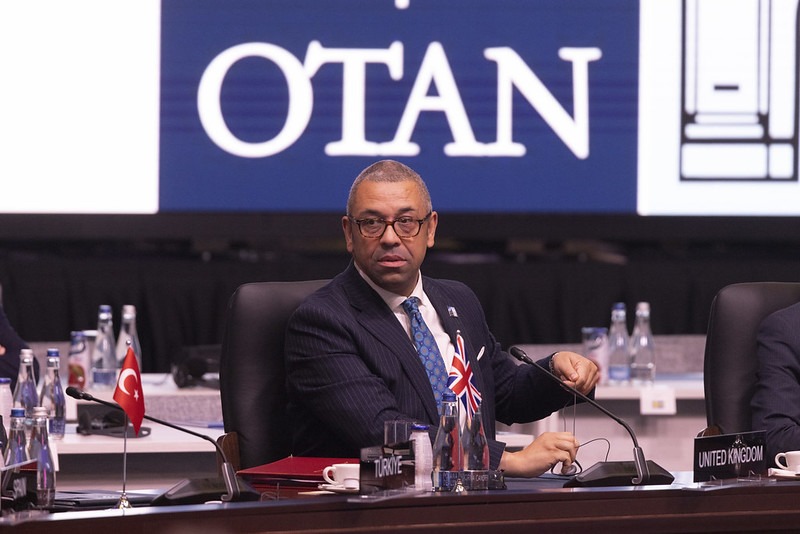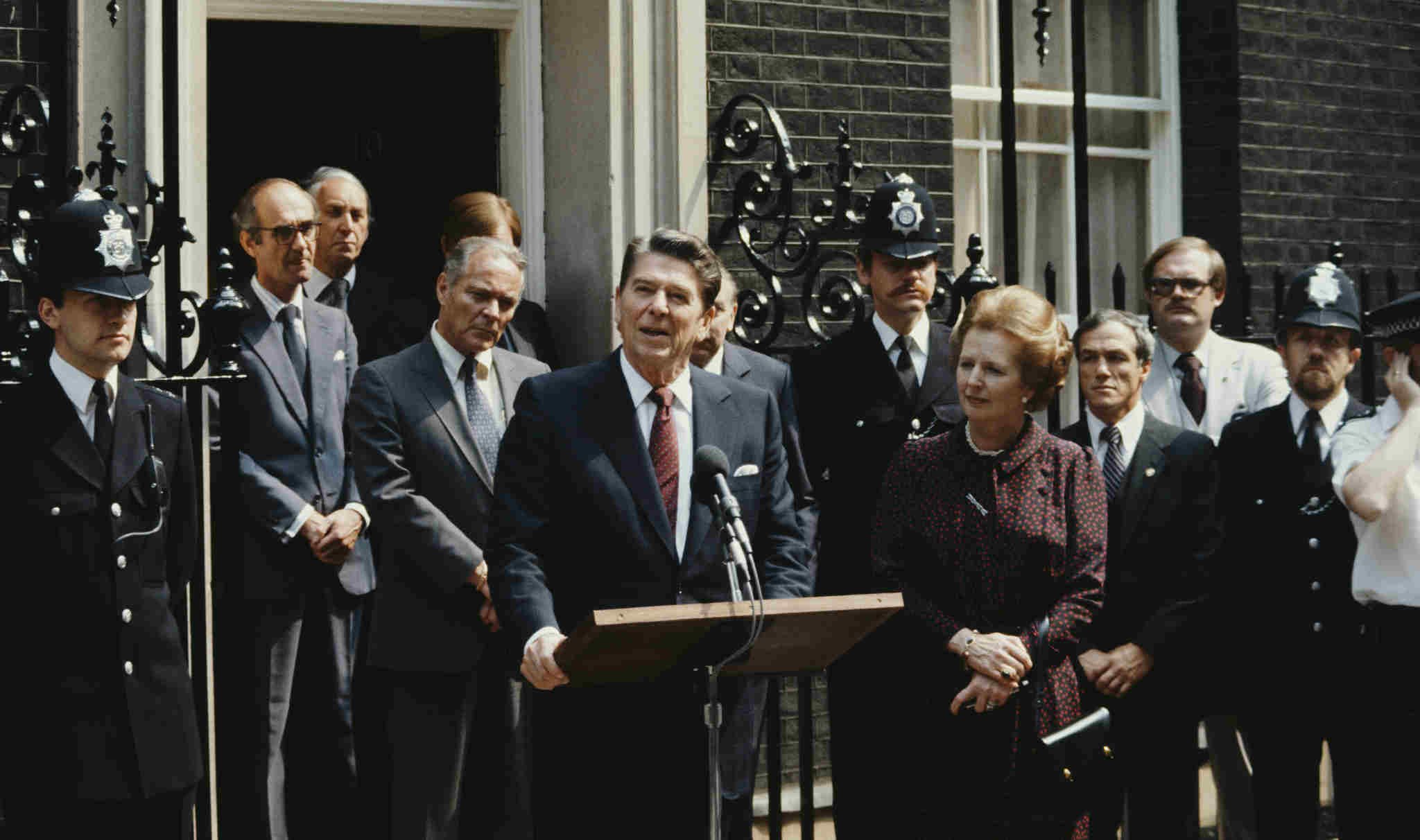The UK Foreign Office has poured at least £25m into the often shadowy “counter-disinformation” industry since January 2018, Declassified has found.
The true figure is likely to be much higher since the government has only published its spending data up to May 2022.
When asked why more recent data was not available, a Foreign Office spokesperson refused to answer, telling Declassified: “Transparency spending data will be published in due course”.
Declassified has found that four UK-funded “counter-disinformation” organisations are directed by individuals who previously worked for the British or US foreign policy establishment.
These organisations tend to focus on Russian war crimes and information operations, particularly in Ukraine, while failing to conduct comparable investigations into Britain, the US or NATO.
Much of these groups’ research is thus unidirectional, presenting malign information operations as the sole domain of enemies identified by the UK government. The impact is likely to be one-sided information entering the public news arena.
Meanwhile, some of these organisations cast the “disinformation” net so widely that legitimate political views are branded as “disinformation”, and targeted for suppression.
The UK government’s funding of the “counter-disinformation” industry consequently looks more like an information operation in itself rather than a neutral effort to combat “fake news”.
Further, secretive UK-funded research into “disinformation” and foreign-sponsored information operations can serve to justify the bloating of the UK’s national security budget.
Centre for Information Resilience
The UK government has given at least £2.7m to the London-based Centre for Information Resilience (CIR) since January 2021. Around 40 percent of this has been provided since 24 February 2022, when Russia launched its invasion of Ukraine.
According to its website, the CIR “is an independent, non-profit social enterprise dedicated to countering disinformation, exposing human rights abuses, and combating online behaviour harmful to women and minorities”.
The organisation was founded by two Foreign Office veterans, Ross Burley and Adam Rutland, who remain the two directors of the CIR.
Burley served in London, Washington and Tel Aviv, and “designed, implemented, and led several of the UK Government’s counter disinformation programmes” from 2017-20. In Israel, he was the press officer at the British embassy during 2012-14.
Burley remains closely linked to the UK government, working in its cross-government Stabilisation Unit since 2017 “as a Civilian Deployable Expert in strategic communications”. The government deploys such civilian experts to “support UK government activities in fragile and conflict-affected states, and to multilateral missions”, it states.
After leaving the Foreign Office Burley worked for over two years from 2017-20 as deputy head of campaigns and project director at the Zinc Network, a major UK government contractor which addresses disinformation. It is not known what work Burley undertook at the organisation.
Zinc was found in 2019 to be involved in a covert UK government counter-terrorism programme directed at the Muslim community.
Burley’s co-founder, Adam Rutland, worked for 14 years in the Foreign Office, including in its Communications and Engagement Department and as a diplomat in Jakarta, Indonesia.
The CIR’s latest accounts, for 2020-21, suggest that Burley and Rutland’s work at the CIR was recently “identical” to the work they conducted for the Foreign Office. The accounts show that the daily rate approved for the directors, at £620, “is one heavily discounted from the rate previously agreed by HM Government (£900) for identical work delivered to HMG by the Directors prior to CIR’s existence”.
Advisers
The CIR’s seven-person advisory board includes Cindy Otis, who spent a decade as a CIA analyst, and Toomas Hendrik Ilves, a former Estonian foreign minister who led the country’s NATO accession process.
Also on the board are Mo Hussein, a former chief press officer at 10 Downing Street and media adviser in the Ministry of Defence, and Elisabeth Braw, a fellow at the neo-conservative American Enterprise Institute. Other CIR employees have worked for NATO strategic communications and British army intelligence.
The CIR told Declassified: “We carry out projects that are aligned with our core values of supporting and defending human rights and democracy. Our investigations are based on reviewing, cross-checking and analysing empirical, open source evidence. Open source data, whether it is satellite imagery or social media content, is generated and provided by people outside our organisation and available to all to be meticulously scrutinised.”
It added: “We believe the explosion of disinformation and online harms has eroded trust within society and for democracy. The scale of the problem is beyond just one sector of society: we believe the only way to challenge this erosion is by all sectors working collaboratively together.
“That’s why we work with governments, but also with academia, the media, other NGOs and volunteers. But our own work – i.e. our reports and what we choose to focus on – is driven by ourselves only and is entirely independent.”
Media operations
Since being founded in 2020, much of the CIR’s work has focused on Russia’s invasion of Ukraine. “We knew that the Kremlin would try everything to distort the information environment. Our resolve to stop them remains”, the CIR tweeted last December, adding “Our own investigators have exposed hundreds of examples of Russia’s malign approach to its war”.
The CIR states that it has been “determined to create resources that policymakers, journalists, NGOs, and legal bodies could rely on” and that “we host one of the largest databases of incidents from the war”. Its work with media outlets aims “to provide verified stories driven by open source”.
The CIR boasts that it has partnered with “dozens of media outlets” including the Associated Press, the BBC, CNN, Guardian, Financial Times, Sky News, New Statesman, VICE News, Times, New York Magazine, and the Washington Post. This has involved “over 50 in-depth investigations”, including joint investigations with the BBC, Guardian, New York Times and others.
“Declassified could find no significant work by the CIR focused on Western disinformation or war crimes.”
The organisation states that its work focuses on “malign influence operations on social media and traditional platforms”. In 2023, the CIR plans to launch “a campaign to help fight disinformation in Europe around the war in Ukraine”.
However, the CIR’s work does not appear to extend to the UK or US governments or their allies. Declassified could find no significant work by the CIR focused on Western disinformation or war crimes.
Among its other work areas, the CIR launched a UK-funded project in Myanmar “to collect and verify evidence of serious human rights violations and abuses”. Among other issues, this project exposed “the use of Russian-supplied fighter aircraft in attacks against civilians” in the country.
The CIR told us that Myanmar Witness is the “CIR’s flagship project in terms of funding, reporting (the team has published more than 40 investigative reports) and staffing”. The project investigates, verifies and records human rights incidents in the country, working with the Independent Investigative Mechanism for Myanmar, the UN Human Rights Council and other accountability bodies.
The CIR is also listed as a participating organisation on a Foreign Office-led multi-million pound “Global Security Rapid Analysis” programme.
‘Incredible job’
In recent months, the CIR has attempted to expand its operations into the US. In September 2022, it announced that Nina Jankowicz had joined the organisation (though foreign registry files show that she has been on the CIR payroll since at least 2021).
A veteran information warrior, Jankowicz was selected in April 2022 to lead the new “Disinformation Governing Board” in the US Department for Homeland Security, before a flood of concern about this Orwellian unit caused these plans to be abandoned. She has now been named as the CIR’s vice president.
The CIR is also funded by the US State Department, USAID, and Australia’s Department for Foreign Affairs and Trade. The organisation does not disclose whether it has other sources of funding, nor how much it receives from each source.
Alicia Kearns, a Conservative MP who chairs parliament’s foreign affairs committee, said in a debate on Ukraine: “On information operations, we have done an incredible job. The UK has led on this internationally, exposing the reality of what is happening on the ground and the false flags. I pay tribute to Bellingcat and the Centre for Information Resilience, which have done incredible work”.
Atlantic Council
At least £6.7m has been given to the Atlantic Council Digital Forensic Research Lab (DFRLab) by the UK government since January 2018, Declassified has also found.
NATO’s unofficial thinktank, the Atlantic Council, which is based in Washington DC, also receives funding from the US Departments of Defense and State as well as arms corporations Raytheon and Lockheed Martin.
The UK Foreign Office, however, is one of a handful of contributors to provide an annual sum of over $1m, along with the embassy of the United Arab Emirates and Goldman Sachs.
As part of the Atlantic Council, the DFRLab describes its mission as to “identify, expose, and explain disinformation where and when it occurs using open source research”.
In 2018, it partnered with Facebook “to combat disinformation in democratic elections” around the world. This would be an impossible feat in a state such as the United Arab Emirates, given the Gulf regime does not hold democratic elections.
The DFRLab’s most recent work has focused on “the Kremlin and pro-Kremlin media’s false/misleading narratives in the lead up to the invasion of Ukraine”. Those narratives include the notion that “the West is creating tensions in the region” and that “Ukraine is aggressive”.
The DFRLab’s senior director, Graham Brookie, previously worked for five years in the White House, latterly as “advisor for strategic communications” for the National Security Council. His role included “coordinating a cohesive record of former US President Barack Obama’s national security and foreign policy”.
Brookie has tweeted that the DFRLab is dedicated “to expose Russia”, and has praised then prime minister Liz Truss and US secretary of State Antony Blinken for navigating the global information environment.
Jessica Batke, a senior China editor at the DFRLab, is a former analyst for the State Department’s Bureau of Intelligence while Moira Whelan, a non-resident fellow, served as the US State Department’s Deputy Assistant Secretary for digital strategy under President Obama.
A number of former senior CIA and US military figures sit on the Atlantic Council’s board of directors, including Jim Mattis, David Petraeus, Wesley Clark, and Michael Morell.

Domestic politics
At the same time in late 2019 that the DFRLab was receiving UK government funding, its associates involved themselves in British domestic politics.
In the weeks leading up to the December 2019 UK general election, then Labour leader Jeremy Corbyn unearthed documents showing the NHS was on the table in trade talks with the US.
Shortly after, DFRLab associates were among those who suggested the leak resembled a Russian disinformation campaign. Graham Brookie, for instance, declared: “Whoever did this… was absolutely trying to keep it a secret. It carries the spectre of foreign influence”.
Ben Nimmo, a founding member of the DFRLab and then head of investigations at Graphika, added: “What we are saying is that the initial efforts to amplify the NHS leak closely resembles… a known Russian operation”.
On its Twitter page, the DFRLab went so far as to say that the documents furnished by Corbyn were “disinformation about the Conservative Party and its plans for the NHS”. In fact, the veracity of the documents was never seriously in question.
Between November 2019 and January 2020, the Foreign Office gave the DFRLab over £433,000.
In 2015, before Corbyn had been elected as leader of the opposition, Nimmo had already begun using flimsy evidence to smear the MP as a Russian asset.
Global disinformation
Another organisation the UK government has funded is the Global Disinformation Index (GDI), to which it has given at least £2.7m since January 2018.
The GDI describes its mission as “to reduce disinformation” by removing “the financial incentive to create it”. To this end, it compiles lists of news websites which it deems guilty of “disinformation”, and distributes these lists to advertising companies so the websites can be demonetised.
The GDI was founded in Britain in 2018 by Dr. Daniel Rogers, a professor at New York University who previously worked in the US intelligence community, and Clare Melford, a former business and charity consultant.
Rogers, the GDI’s executive director, is, according to one biography, “a computational physicist with experience supporting Defense and Intelligence Community Cyber Operations”. He is also a security fellow at the Truman National Security Project, a “community of leaders” in the US which advocates for “smart national security solutions that reinforce strong, equitable, effective, and nonpartisan American global leadership”.
Anne Applebaum, an historian who sits on the board of directors of the National Endowment for Democracy, is also on GDI’s 16-strong advisory panel, alongside Ben Nimmo.
The GDI was until recently also funded by the US government agency the National Endowment for Democracy.
NATO and Ukraine
The GDI says that its open source intelligence hub tracks disinformation and extremism online and provides “intelligence on emerging disinformation threats to a broad array of governments, NGOs, online platforms and the media”.
The organisation adds that “malicious actors peddle disinformation” and that this can derive from “highly organised nation states motivated by geopolitical aims”.
Neither the UK nor US governments appear to feature in the GDI’s definition of “nation states motivated by geopolitical aims”. In fact, GDI publications seem to demonstrate a pro-NATO bias.
In 2022, for instance, the GDI published a series of reports on “Ad Funded Disinformation on Conflict in Ukraine”. Among the organisation’s examples of “anti-Ukrainian and anti-democratic disinformation” were legitimate – albeit disputed – views, including: “Action taken by NATO members is invalid”, “Ukrainians are killing civilians”, and “there was a coup d’etat in Ukraine in 2014”.
When asked about UK government funding to the GDI, Foreign Office minister Leo Docherty told parliament: “Russia has made disinformation central to its foreign and security policies and invested massively in systems to deny, obfuscate and distract from its actions… GDI uses technology to identify malign use of the internet and works with technology companies to respond appropriately”.
Blacklists
The GDI recently came under fire in the US for compiling secret blacklists of conservative newspapers and attempting to defund them, accusing them of peddling disinformation.
Jeffrey Clark, ex-acting head of the Justice Department’s Civil Division, told the Washington Examiner, “Any outfit like that engaged in censorship shouldn’t have any contact with the government because they’re tainted by association with a group that is doing something fundamentally against American values”.
The GDI reportedly compiles a “dynamic exclusion list” that it feeds to corporate entities. It has identified the ten “riskiest” news outlets for disinformation as the American Spectator, Newsmax, the Federalist, the American Conservative, One America News, the Blaze, the Daily Wire, RealClearPolitics, Reason, and the New York Post.
“The GDI recently came under fire in the US for compiling secret blacklists of conservative newspapers”
The GDI study claims that the New York Times, the Washington Post and the Wall Street Journal are among the US media with the lowest level of disinformation risk.
The Foreign Office only funds the GDI for “activities outside the US” and it is not known if similar blacklists and censorship operations have been carried out in the UK.
In August 2021, the organisation advertised to recruit “a senior policy expert to lead our growing and dynamic organisation’s EU and UK policy work”.
Partnerships and dialogues
The Foreign Office is the sole funder of the Open Information Partnership (OIP), which describes itself as a network of organisations addressing disinformation.
The OIP is one of the UK government’s counter disinformation programmes that Ross Burley, formerly of the Foreign Office and now director of the CIR, is said to have led.
UK support for the OIP was mentioned by foreign minister Sir Alan Duncan in April 2019 and it was reported in a story given to Sky’s Deborah Haynes to be receiving £10m over three years.
However, the Foreign Office recently told parliament it provided £12.75m to the OIP between 2018-2021 with more funding sourced from the Conflict, Stability and Security Fund in the current financial year.
The OIP’s lead partner appears to be the Zinc Network while others include the DFRLab. One biography of Nina Jankowicz notes that she has sat on the advisory board of the OIP. It is not clear who the board’s other members are.
Much of the OIP’s work appears to involve countering Russian disinformation, with its partners focused on Moscow’s information activities in Eastern Europe.
“The Foreign Office is the sole funder of the Open Information Partnership”
The Foreign Office also funds the Institute for Strategic Dialogue (ISD), along with several other governments, and tech organisations such as Google, Facebook and YouTube. The UK amounts, however, are unclear, as the government website does not appear to give details, and the Foreign Office refuses to say.
Countering disinformation is one of the ISD’s three focus areas. The organisation says its work “surveys the wide range of disinformation tactics used to promote polarisation, to undermine elections and to threaten democratic discourse… ISD uses this research to provide timely and evidence-based data to media, policy and civil society representatives”.
One of the ISD’s recent research projects focused on “the effectiveness of the restrictions placed on Russian state-affiliated media by the European Union” and “potential circumvention methods and their success in enabling pro-Kremlin content to reach European audiences”.
The ISD is co-founded and directed by Sasha Havlicek, described as an adviser to governments “at the highest levels”, and managing director Arabella Phillimore, a former staffer at the Financial Times and an advisor on Afghanistan to the Foreign Office.
Doublethink
The EU Disinfo Lab (EUDL) is another of the organisations the UK government has funded, to the tune of at least £545,369 since January 2019. Registered in Brussels, its other funders and leadership are not disclosed on its website.
The EUDL describes its mission as “to expose disinformation campaigns, raise awareness around disinformation issues and gather and support civil society resilience to disinformation to foster a stronger information ecosystem”. It focuses on disinformation relating to climate change, Covid-19, and the war in Ukraine, and cites the GDI as a useful source on the latter.
Finally, the UK government has given at least £68,583 to Doublethink Lab, an organisation founded in 2019 which researches “malign Chinese influence operations and disinformation campaigns and their impacts”.
Doublethink Lab’s flagship project is the China Index, which seeks to measure the influence of the Chinese government around the globe. It also produced a widely-publicised report on how Beijing waged “disinformation warfare” against Taiwan in the lead-up to Taiwan’s 2020 elections.
Declassified has defined as “counter-disinformation” organisations any group which lists countering disinformation in its mission statement as one of its key functions.
The Foreign Office has also provided millions of pounds to the Global Strategy Network and Zinc Network. Though both of these organisations engage in some “counter-disinformation” work, the UK government appears to pay them largely for consultancy purposes.
The Atlantic Council Digital Forensic Research Lab and the Global Disinformation Index were asked to comment.







